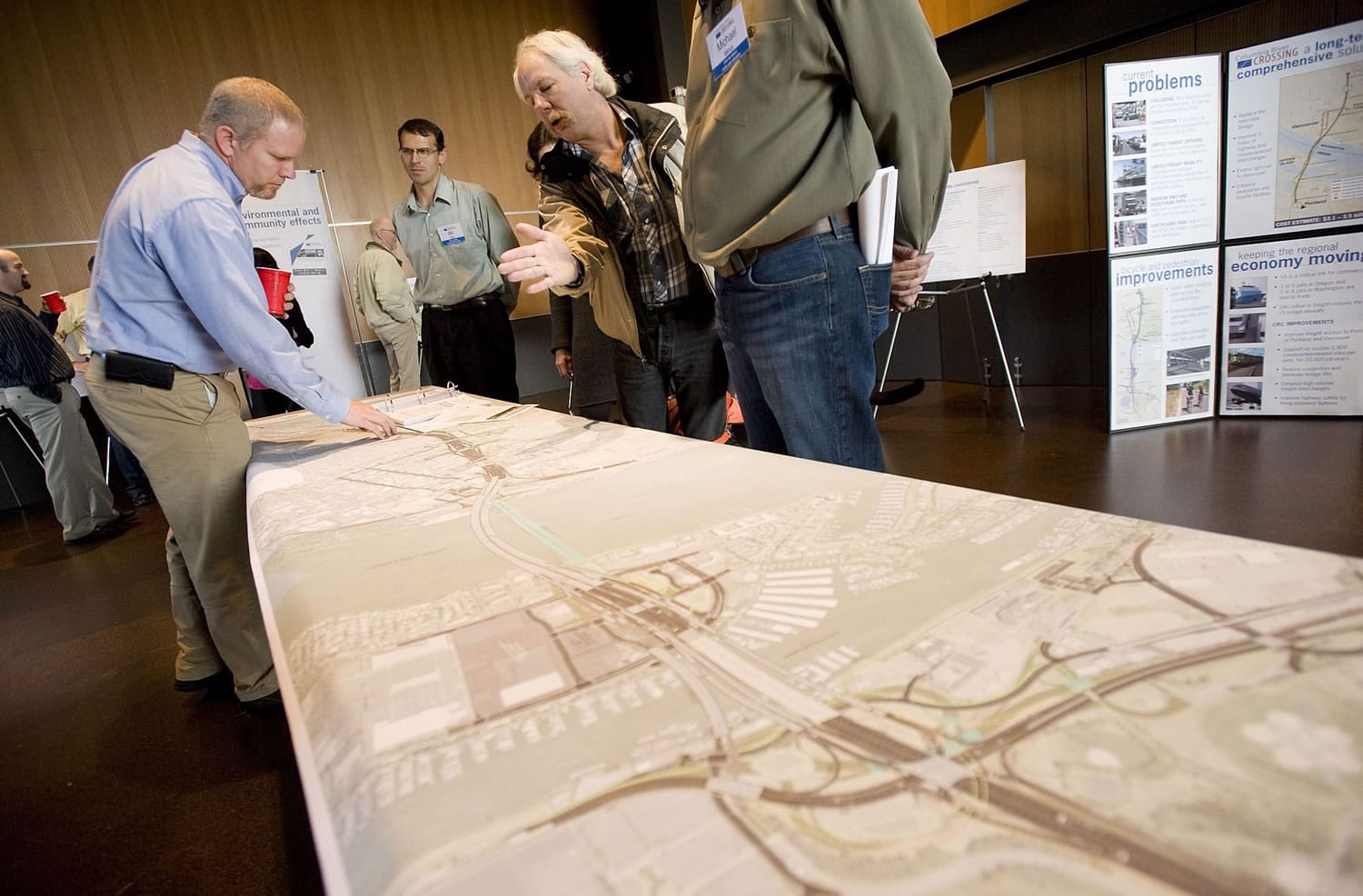Columbia River Crossing officials will host two more open house meetings Thursday at the Jantzen Beach SuperCenter Community Room, 1405 Jantzen Beach Center in Portland. The meetings begin at 2 and 6 p.m., and will both follow the same format.
CRC consultant sues to stop release of records
Some people came to learn. Others came to voice long-held opinions.
Brenda Palmer came to one of Wednesday’s Columbia River Crossing meetings in Vancouver looking for the answers she’s sought for months.
“I wanted to see if they had firmer answers than they’ve had in the past,” said Palmer, who lives in Vancouver’s Shumway neighborhood, in the megaproject’s footprint just west of Interstate 5. “I’m tired of the runaround.”
Palmer was one of dozens of people who turned out for a pair of open house-style CRC meetings at the Vancouver Community Library. There were no podiums, and officials didn’t give any formal presentations. Instead they manned several question-and-answer stations covering various facets of the estimated $3.1 billion to $3.5 billion project. Attendees offered thoughts as they milled about the space near the library entrance.
The setup included large, detailed display maps of the project to replace the Interstate Bridge, revamp the freeway on both sides of the Columbia River and extend Portland’s light rail system into downtown Vancouver. Planners answered questions about the years-long planning process, property impacts and next steps, among other topics. Hard copies of the project’s voluminous Final Environmental Impact Statement — sent to federal authorities for approval last month — were available for visitors to look through in a “reading area.” A record of decision from the feds is due by the end of this year, which planners hope keeps the project on track to secure funding and break ground by 2013.
An afternoon and evening meeting at the Vancouver library drew more than 100 people by early Wednesday evening. Two more gatherings are planned for Thursday in Portland’s Hayden Island area.
Palmer moved into her home last November, and soon received notice from the CRC that it stood in the path of construction. Without certain plans, she first heard the project would have to acquire her entire property and displace her. Then that she might be able to stay. Then, again, that she might lose her home.
Palmer left Wednesday’s meeting still without a clear answer, she said. But she felt closer than before after speaking with a few CRC officials at the library.
“I feel like I’m in the process,” Palmer said. “If I’m definitely going to lose the house, I need to prepare myself mentally.”
Most visitors didn’t offer anything that hasn’t already been said about the much-discussed, controversial project. Plenty in the crowds were against tolls, part of the CRC’s financing plan. Some decried the project’s huge scope and cost. One Vancouver resident offered his own solution to relieving traffic on the Interstate Bridge: Take the money already spent on CRC planning — more than $130 million and counting — and put that toward economic development in Clark County so residents don’t have to drive to Oregon to work.
Vancouver resident Lance Sjogren, who lives downtown, might be a rarity in the politically charged CRC debate. He doesn’t hold a strong position one way or the other.
“I kind of have a split opinion,” Sjogren said. The existing Interstate Bridge needs to be replaced, he said, but the project’s cost is a problem.
Sjogren stood at one of the project maps as he spoke, one of the more popular stops early in the afternoon meeting. He and others looked over the number of freeway lanes planned for I-5, new ramps, the curved bridge orientation, and proposed light rail lines running along Vancouver’s Washington and Broadway streets on the way to Clark College.
Terry Sasser, who lives in the Salmon Creek area, said he believes the project is necessary. He even said he supports tolling to pay for it — as long as the price is reasonable.
Sasser remembers paying tolls on I-5 when the second span of the existing Interstate Bridge opened in the 1950s. He later watched the Glenn Jackson Bridge on Interstate 205 go up seemingly much more smoothly, and lamented the political nature of the CRC process that’s costing time and money.
“I do think it’s needed, and it will be needed for the next 50 years,” Sasser said.
Even Palmer said she wants the bridge to be replaced. But she’d like to see the project scaled back so it doesn’t impact so many houses, including hers. No matter how many freeway lanes or new ramps go in near the bridge, I-5 still eventually shrinks down and will create bottlenecks outside the project area, she said.
CRC highway engineering manager Casey Liles said most of the questions and comments he heard Wednesday afternoon were familiar ones. That doesn’t mean they all shared the same view of a project that’s still two years from lifting a shovel.
“I bet if you asked every person here,” Sasser said, “You’d get a different answer.”
Eric Florip: 360-735-4541; www.twitter.com/col_enviro; eric.florip@columbian.com.




